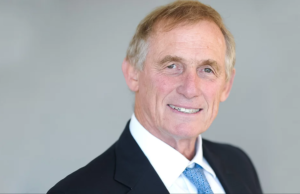 Grab your favorite beverage and join us for a live Happy Hour Webinar to discuss the impact that COVID-19 has had on global oil trade and climate change! The environment has been a (short term) beneficiary of COVID-19. From altering supply chains, to collapsing oil prices, to mixing virtual and physical presence in the workplace, this discussion will examine the potential environmental impacts of how Americans are rethinking trade, work, and travel in the post-pandemic world.
Grab your favorite beverage and join us for a live Happy Hour Webinar to discuss the impact that COVID-19 has had on global oil trade and climate change! The environment has been a (short term) beneficiary of COVID-19. From altering supply chains, to collapsing oil prices, to mixing virtual and physical presence in the workplace, this discussion will examine the potential environmental impacts of how Americans are rethinking trade, work, and travel in the post-pandemic world.
Dr. Theresa Sabonis-Helf is the Inaugural Chair of the Science, Technology and International Affairs concentration in the Master’s Degree program at Georgetown University’s School of Foreign Service. Prior to joining Georgetown, she was a Professor of National Security Strategy at the National War College in Washington DC. She has lived and worked in seven countries of the Former USSR, has assisted two nations with the development of their first National Security Strategies, and has co-edited two volumes on Central Asia’s political and economic transition. She has also published and lectured extensively on energy security, climate change policies, post-Soviet energy and environmental issues, regional water politics, regional trade and transit, and the politics of electricity. She is a frequent advisor to the US Department of State and USAID and is also a member of the Council on Foreign Relations.
This FREE Live Webinar Event will be taking place on
Thu, July 9, 2020 from 6:30 PM – 7:30 PM EDT
Event sponsored by: 





 Mr. Rupert Scofield co-founded FINCA International — the founder and majority owner of a global network of 20 microfinance institutions and banks on five continents — in 1984 and has served as President/CEO since 1994.
Mr. Rupert Scofield co-founded FINCA International — the founder and majority owner of a global network of 20 microfinance institutions and banks on five continents — in 1984 and has served as President/CEO since 1994.
 While China is a member of the WTO, at the same time it has developed and pursued its own competing model of globalization, which not only competes with the Bretton-Woods model but is often in violation of the rules governing its membership in the WTO. The best example of the Chinese model of globalization is The Belt and Road Initiative – a long-term plan for regional interconnectivity and dominance in Asia to which China has committed some $8 trillion dollars. Both the WTO and The Belt and Road are facing significant challenges. This session will lay out in broad terms the two Globalizations allowing us to discuss this clash of globalizations and the implications for US foreign and trade policy.
While China is a member of the WTO, at the same time it has developed and pursued its own competing model of globalization, which not only competes with the Bretton-Woods model but is often in violation of the rules governing its membership in the WTO. The best example of the Chinese model of globalization is The Belt and Road Initiative – a long-term plan for regional interconnectivity and dominance in Asia to which China has committed some $8 trillion dollars. Both the WTO and The Belt and Road are facing significant challenges. This session will lay out in broad terms the two Globalizations allowing us to discuss this clash of globalizations and the implications for US foreign and trade policy.